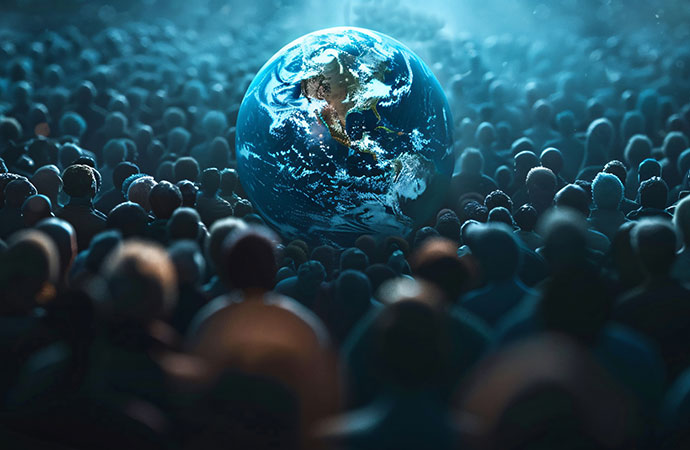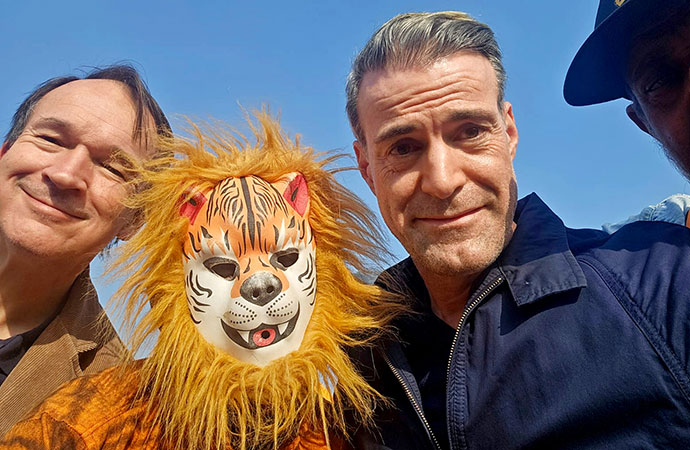Column

Freepik
The World Economic Forum (WEF) has just produced a report based on its Global Risks Perception Survey for 2024-2025. The report identifies five key challenges to the world.
The first risk is that of state-based armed conflict. "Wars in Ukraine, the Middle East, and Sudan have brought unprecedented instability, propelling armed conflict to the top of the global risk list," the report says. "This issue, ranked ninth last year, now holds the number one spot, with nearly a quarter of surveyed experts citing it as their top concern."
Then there are extreme weather events. "The escalating use of fossil fuels is intensifying the frequency and severity of floods, wildfires, and storms. Experts attribute $143 billion of the $451 billion in weather-related damages in 2023 directly to climate change."
Geo-economic confrontation follows. "From trade wars to tariffs, the rise of protectionist trade policies reflects growing uncertainty in the global economy. This risk underscores increasing economic tensions and their potential to disrupt international cooperation."
Then come misinformation and disinformation. "Advancements in technology are accelerating the spread of false information, fostering civil unrest and threatening the free flow of information. The consequences could include heightened societal divisions and restrictions on communication."
Finally, there is societal polarisation. "Political divisions and growing inequality are eroding trust in institutions and fragmenting shared values. This deepening polarisation is weakening the foundation of societal cohesion worldwide."
The easy way of looking at these important results of the survey would be to concentrate on the most prominent threat: that of armed conflict. Yes, after Russia's invasion of Ukraine, Hamas' attack on Israel and the fearsome Israeli counter-offensive on Gaza, and the war in Sudan, it is to be only expected that the Asia-Pacific region will follow suit. Indeed, the risk of conflict over Taiwan could be disastrous for countries in Asia and beyond.
However, a far greater threat is the way in which the threats are interconnected. As the report notes, geopolitical tensions are associated with geo-economic confrontation (sanctions, tariffs, investment screening and so on), which is driven in turn by inequality, societal polarisation and other factors. Extreme weather events are as well a product of economic practices revolving around the unabated use of fossil fuels such as coal, oil and gas. Misinformation and disinformation thrive in a world fractured strategically, economically and socially.
Looked at in this way, related global threats must have a common origin somewhere. There is no point in blaming Adam and Eve: They were blissfully unaware of the post-lapsarian world they were bringing into being after having been chased out of Eden. If there is a common source, it lies within the human inability to evolve in accordance with the finite material and imaginative limits of the universe.
Ecological limits are the prime factor here. The earth's abilities are not infinite. It simply cannot bear the demands of exponential population growth beyond a certain point. According to Worldmeter, the current population of the world is 8.2 billion. Now, compare the figures: By 10,000 BC, the world's population was around 1 million. Then, in one estimate, 5,000 years ago, the population shot up to 14 million; 4,000 years ago, it was 27 million; 3,000 years ago, it was 50 million; 2,000 years ago it was 200 million; 1,000 years ago it was 400 million. Millions have given way to billions in human numbers, yet the earth remains the same. Yes, scientific advances, particularly in food production, have allowed the population to increase, but the science of plenitude can come at a cost to the finitude of the environment. Forests, grasslands, or any other piece of nature - all are up for sale so long as they provide immediate although passing sustenance. Global warming and climate change are the revenge that nature extracts from its enemies. The environment does not tolerate pretenders to its inviolate agency for long.
All economics is environmental. Economics is meant to be the art of organising the entire world materially as a single household whose members have commensurate rights and responsibilities. Trade wars and so on reflect the inability of the world to live by this simple principle. Economics as it is practised reflects instead a bifurcation of the world into those who possess the resources of wealth, power and hope, and those who do not.
The arbiters of demands between global haves and have-nots are states. There is the excellent notion that war makes states (and therefore that states make war to perpetuate themselves). Once the biological unsustainability of the world is manifested in the predatory nature of economic relations existing within states, it follows that states cannot but become imperial (or colonial) themselves and cannot but seek to extract material and other resources from weaker states. Imperial states run up first against resistance from those weaker states, which normally proves to be unsuccessful because the world order is stacked against the weak. But because there is more than one predatory state in the world, great powers compete with one another for hegemony whether through direct or proxy wars. When that conflict cannot be resolved nationally or regionally, it leads to world wars.
Information plays a crucial role in all this. Information is the fourth factor of economic production after land, labour and capital. What is economic is also social. Information communicates ideas and values along with news among its receivers, influencing and sometimes even determining how they respond to events and trends. Misinformation (the unintended transmission of false information) and disinformation (the wilful dissemination of untruth) belong in a divisive atmosphere of distrust in which humans are incapable of making up their own minds because they have no role in determining the course of the environment, the direction of the economy and the strategic ordering of world affairs.
It is a sorry state all in all.
But we, as humans, still possess agency. The first step to exercising it is to say that we have not been discarded by the world. Instead, we have to embrace it, with all its faults and warts, all over again.
That is it.
The writer is Principal Research Fellow at the Cosmos Foundation. He may be reached at epaaropaar@gmail.com

























Leave a Comment
Recent Posts
Pedaling Through the Mangroves ...
The journey from the bustling streets of Barishal to the serene, emera ...
Why the Interim Government mus ...
Two weeks out from what is expected to be a red letter day in the figh ...
Doesn’t matter who thinks what about Bangladesh deci ..
The Other Lenin
US President Donald Trump said his administration
Govt moves to merge BIDA, BEZA, BEPZA, MIDA